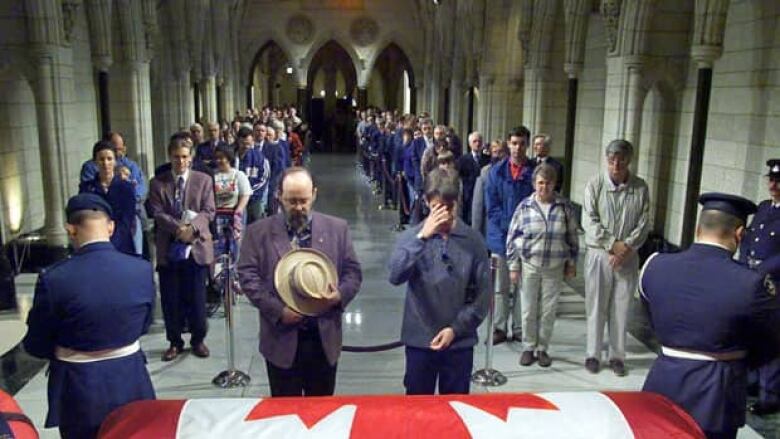FAQ: State funerals

Q: What is a state funeral?
A: A state funeral is a public event offered and organized by the Government of Canada in co-ordination with the family of the deceased. A state funeral provides an opportunity for the public to participate in demonstrations of national grief.
Q: Who gets one?
A: Present and former governors general, prime ministers and sitting members of cabinet, or any other eminent Canadian for whom the prime minister wants to offer it. Families can turn them down if they choose.
Q: What can it include?
A: The Department of Canadian Heritage works with the family of the deceased to decide what the state funeral will include. Every state funeral is distinct. The funeral can be anywhere not necessarily in Ottawa and can include a lying-in-state, procession, funeral service, committal, and a post-committal reception. Some of these elements may be accessible to the public.
Q: What is a lying-in-state?
A: Lying-in-state is a term used to describe the tradition where the remains of the deceased restin public view, with a vigil, to allow official dignitaries andthe public to pay their final respects.
Q: What does it mean?
A: Canadians get an opportunity to publicly honour the deceased's contribution to public life andoffercondolencesto the family.
Q: How common are they?
A: Other than Thomas D'Arcy McGee, a Father of Confederation who was assassinated 1868, only two Canadian politicians who were not sitting ministers or prime ministers have received state funerals, most recently Conservative MP Jim Flaherty, who died April 10, 2014, less than a month after he stepped down as federal finance minister, and former NDP leader Jack Layton, who died in 2011.
Former governors general Romeo LeBlanc (2009) andRay Hnatyshyn (2002) were honoured with state funerals, as is customary for viceroys. Former prime minister Pierre Trudeau had a state funeral and lying-in-state in the Hall of Honour on Parliament Hill in 2000. Lincoln Alexander, a former Conservative MP and cabinet minister and the former lieutenant governor of Ontario, received a rare provincial state funeral in 2012.












_(720p).jpg)


 OFFICIAL HD MUSIC VIDEO.jpg)
.jpg)



























































































